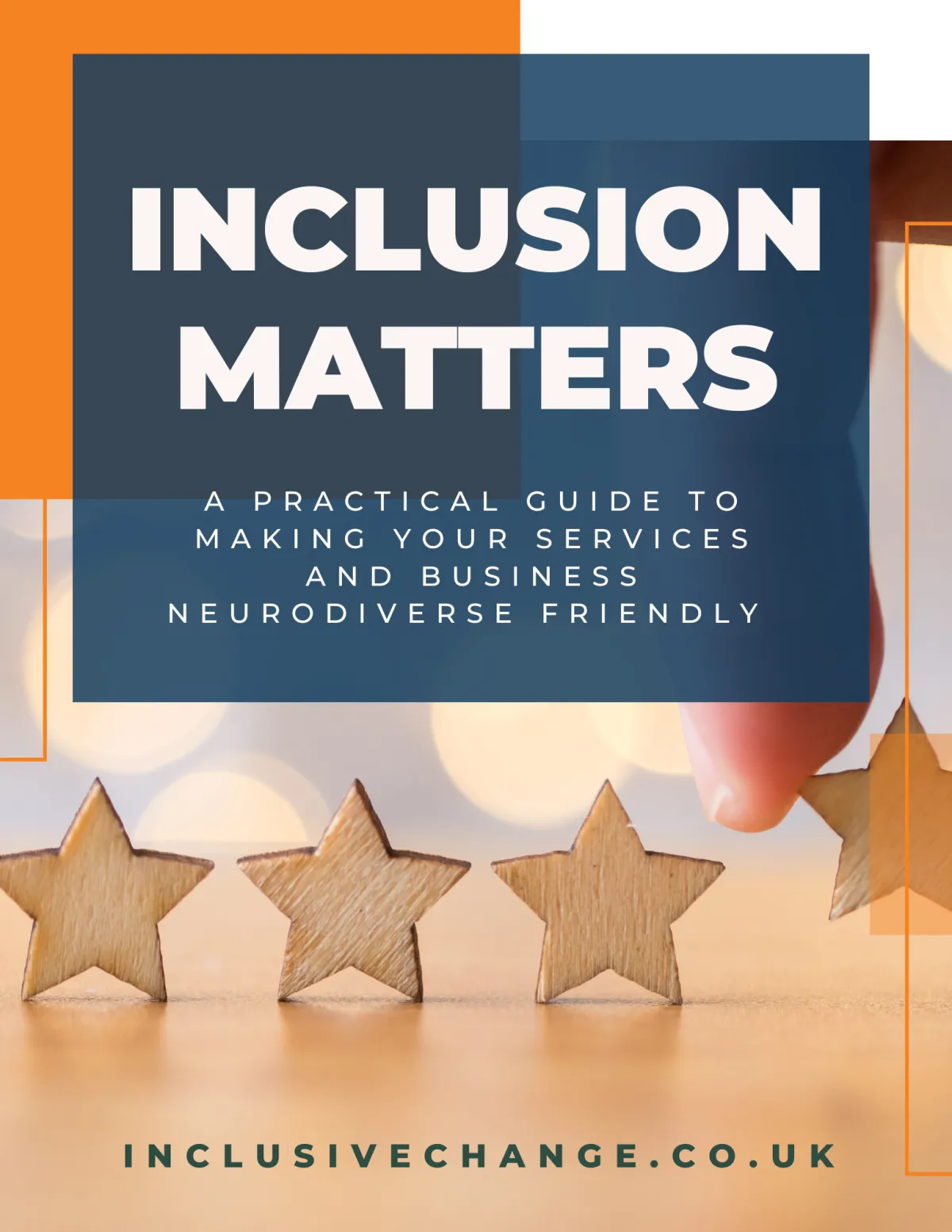Inclusive Change
Start the conversation
Read our blogs and discover more about neurodiversity through our links


When Understanding Breaks Down: Lessons from a £2 DVD Incident
This week, a distressing and heart-wrenching story emerged in the UK about a non-verbal autistic girl who wanted to buy a £2 Thomas the Tank Engine DVD as a Christmas gift. The shop staff, unable to serve her as the store was closing, faced a situation that escalated, leading to police involvement.
As a former law enforcement officer and the owner of Your Village Shop - an award-winning dementia- and autism-friendly shop - I feel deeply saddened by this incident. It highlights a critical gap in communication and understanding when working with neurodivergent individuals.
This situation wasn’t about a DVD; it was about barriers in communication and the consequences of failing to understand each other. Incidents like these don’t have to happen. With the right training and awareness, retail staff, parents, and law enforcement can work together to de-escalate situations compassionately.
The Communication Gap
At its core, this story is about communication—how we understand and respond to someone who communicates differently. For the non-verbal girl, the DVD likely held significant emotional value, particularly as a Christmas gift. When her request was met with refusal due to closing time, she may have been unable to process this change or express her feelings verbally, potentially leading to behaviours others misinterpreted.
The shop staff, likely untrained in autism awareness, struggled to navigate the interaction. Parents, recognising the potential for escalation, called the police to help resolve the situation. However, what should have been a calm intervention turned into a distressing ordeal.
Building Inclusive Retail Environments
For retail staff, creating an inclusive environment for neurodivergent customers doesn’t have to be complicated. Small steps can make a big difference:
Train Staff to Recognise and Respond: Learn the basics of autism, including how sensory processing challenges or difficulties with verbal communication might present in-store.
Be Flexible: A few extra minutes for a customer who struggles with transitions or decisions can prevent misunderstandings and foster loyalty.
Be Flexible: A few extra minutes for a customer who struggles with transitions or decisions can prevent misunderstandings and foster loyalty.
Partner with the Community: Collaborate with local autism organisations to better understand and meet the needs of neurodivergent individuals.
The Role of Law Enforcement in De-Escalation
Parents often turn to law enforcement when they feel a situation is spiralling out of control. Police officers need training that equips them to de-escalate incidents involving neurodivergent individuals calmly and compassionately. Key areas of focus should include:
Understanding Behaviour: Officers should recognise how autism can affect responses to stress, such as avoiding eye contact, becoming non-responsive, or displaying repetitive movements.
Prioritising Calm, Non-Threatening Approaches: Rather than focusing on authority, officers should aim to reduce stress for all parties involved.
Collaboration with Families: Parents and caregivers often have the best insight into how to resolve situations involving their child. Building rapport with them is essential.
Lessons from Your Village Shop
When we established Your Village Shop in South Gloucestershire, our goal was to create a safe and welcoming space for everyone. Our dementia- and autism-friendly shop became a place where neurodivergent individuals and their families could shop without fear of judgment or misunderstanding.
How did we do it?
Training Staff: Our team was equipped with the knowledge to recognise and accommodate a wide range of needs, from sensory sensitivities to communication differences.
Flexibility: We adjusted our policies to prioritise kindness over rigid rules. If a customer needed time to decide, we gave it to them or if they came in after we cashed up the tills, we served them and worked out how to manage that.
Engagement: We partnered with local organisations to continuously improve our practices.
These changes weren’t costly, but they made a world of difference to our customers - and to us.
How Businesses Can Learn and Grow
No one expects retail staff, security staff or police officers to have all the answers, but they should be equipped with the tools to approach situations like this thoughtfully. Here’s how organisations can start:
Invest in Training: Tailored training for retail, security, and law enforcement staff is essential. It should focus on recognising neurodivergence and responding with empathy and practical solutions.
Foster Flexibility: Rigid closing times or policies often cause unnecessary stress. Empower staff to make exceptions when it’s the right thing to do.
Partner with Experts: Work with autism-friendly organisations, like Inclusive Change to review policies and provide ongoing support.
Communicate with Families: Parents and carers often know best how to resolve or prevent an escalation. Their input should be valued.
Moving Forward Together
This week’s incident was heartbreaking, but it offers an opportunity for reflection and growth. By prioritising inclusion and understanding, businesses and law enforcement can prevent situations like this and create environments where everyone feels respected and supported.
If your organisation is ready to take action, I offer tailored training to help retail teams, security staff, and police officers build confidence in supporting neurodivergent individuals. Let’s work together to ensure that what happened in this shop becomes a thing of the past.
A free guide for you
We created a short guide at Inclusive Change - Inclusion Matters: A Practical guide to making your services and business neurodiversity friendly. It's yours, for free - just click on the link, pop in your email address and it will be delivered to your inbox.
And if you want to find out more about training from Inclusive Change get in touch - email us: [email protected]
3
1
Check out Lucy's other features

A Journey of Neurodiversity Advocacy and Change
Read Lucy's interview with Golden Valley, where she explains some of the life events that led her to becoming a full time advocate for neurodivergent and disabled people in the workplace.

Women in the Middle® Entrepreneurs:
EP #52: Sharing the Positives About Neurodiversity with Lucy Smith
Suzy Rosenstein, a master life coach, hosts a podcast called Women in the Middle Entrepreneurs, a podcast where these important conversations about the intersection of being a midlife entrepreneur who's also a woman 50 plus can happen.
Inclusive Change Ltd
The Brightwell, Bradbury House
Wheatfield Drive
Bradley Stoke, Bristol
BS329DB
Copyright 2025 - Inclusive Change Ltd
Companies House: 12412464
VAT NO: 352 1564 17
ICO Reg: ZB081779
UK Register of Learning Providers: 10090652
Reg no: 12412464





